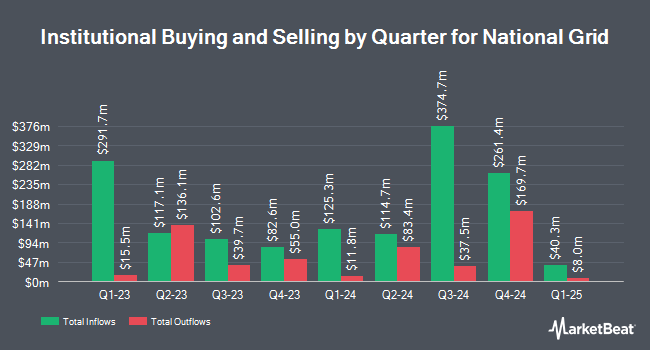American Century Companies Inc. grew its holdings in National Grid plc (NYSE:NGG - Free Report) by 16.8% in the 4th quarter, according to the company in its most recent Form 13F filing with the SEC. The firm owned 163,802 shares of the utilities provider's stock after purchasing an additional 23,552 shares during the quarter. American Century Companies Inc.'s holdings in National Grid were worth $9,733,000 at the end of the most recent reporting period.
Other institutional investors have also modified their holdings of the company. Whipplewood Advisors LLC acquired a new stake in National Grid in the fourth quarter valued at approximately $25,000. Larson Financial Group LLC increased its position in shares of National Grid by 145.6% in the 4th quarter. Larson Financial Group LLC now owns 700 shares of the utilities provider's stock valued at $42,000 after purchasing an additional 415 shares during the last quarter. Rothschild Investment LLC raised its holdings in shares of National Grid by 36.2% in the 4th quarter. Rothschild Investment LLC now owns 723 shares of the utilities provider's stock valued at $43,000 after purchasing an additional 192 shares in the last quarter. Quantbot Technologies LP purchased a new stake in shares of National Grid during the 3rd quarter worth $60,000. Finally, Eastern Bank grew its stake in shares of National Grid by 52.7% during the fourth quarter. Eastern Bank now owns 927 shares of the utilities provider's stock worth $55,000 after purchasing an additional 320 shares in the last quarter. Institutional investors and hedge funds own 4.68% of the company's stock.
Analyst Upgrades and Downgrades
A number of research firms have weighed in on NGG. Citigroup upgraded National Grid from a "neutral" rating to a "buy" rating in a research note on Tuesday, January 21st. StockNews.com upgraded National Grid from a "sell" rating to a "hold" rating in a research note on Friday, March 7th. Finally, Sanford C. Bernstein upgraded shares of National Grid from a "market perform" rating to an "outperform" rating in a research note on Monday, March 17th. One equities research analyst has rated the stock with a hold rating and four have assigned a buy rating to the stock. Based on data from MarketBeat, National Grid presently has an average rating of "Moderate Buy".
Check Out Our Latest Analysis on National Grid
National Grid Stock Performance
NYSE NGG traded down $2.98 during trading hours on Monday, hitting $62.95. The company had a trading volume of 1,507,292 shares, compared to its average volume of 630,560. The business has a 50 day moving average of $62.56 and a 200-day moving average of $62.83. The company has a debt-to-equity ratio of 1.18, a quick ratio of 1.54 and a current ratio of 1.61. National Grid plc has a 1-year low of $54.24 and a 1-year high of $72.21. The company has a market cap of $61.60 billion, a PE ratio of 12.11, a price-to-earnings-growth ratio of 5.64 and a beta of 0.58.
National Grid Profile
(
Free Report)
National Grid plc transmits and distributes electricity and gas. It operates through UK Electricity Transmission, UK Electricity Distribution, UK Electricity System Operator, New England, New York, National Grid Ventures, and Other segments. The UK Electricity Transmission segment provides electricity transmission and construction work services in England and Wales.
Featured Stories

Before you consider National Grid, you'll want to hear this.
MarketBeat keeps track of Wall Street's top-rated and best performing research analysts and the stocks they recommend to their clients on a daily basis. MarketBeat has identified the five stocks that top analysts are quietly whispering to their clients to buy now before the broader market catches on... and National Grid wasn't on the list.
While National Grid currently has a Buy rating among analysts, top-rated analysts believe these five stocks are better buys.
View The Five Stocks Here
Discover the 10 Best High-Yield Dividend Stocks for 2025 and secure reliable income in uncertain markets. Download the report now to identify top dividend payers and avoid common yield traps.
Get This Free Report
Like this article? Share it with a colleague.
Link copied to clipboard.